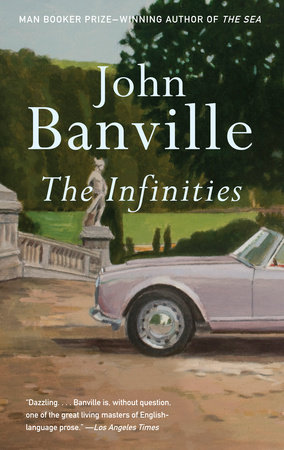Reading Group Center
- Home •
- Books by Category •
- Imprints •
- News •
- Videos •
- Media Center •
- Reading Group Center
The Infinities
By John Banville
1. Why has John Banville chosen The Infinities as his title? In what ways is the novel about time and timelessness?
2. Many novels have been written about illness and death in a family. What makes The Infinities’ treatment of this situation so innovative? What truths about family life does the novel uncover?
3. The Infinities takes off from an imaginatively daring premise—not that the Greek gods have returned to intervene in human affairs, but that they never left. How does Banville manage to make this premise believable and enjoyable?
4. Hermes observes: “I listened to the medleyed buzz that summer makes, and thought how tentative these humans are, how they grope and fumble among their motives, hiding their desires, their hopes and trepidations from each other and themselves, perennial children that they are” (pp. 78–79). In what ways is this observation true of the characters in the novel? Is it an accurate assessment of how humans generally behave?
5. What draws the gods to the human world? How do they regard the predicaments of their earthly creations?
6. Death is an agonizing prospect for humans, but for the gods just the opposite is true—they are haunted by their deathlessness. What tensions are created in the novel through these opposing perspectives? What does the novel as a whole seem to say about death?
7. Rex the dog feels that humans “are afraid of something, something that is always there though they pretend it is not. . . . And when they weep, their sobs and lamentations are disproportionate, as though what is supposed to have upset them is just a pretext and their anguish springs really from this other frightful thing that they know and are trying to ignore” (p. 181). What is this frightful thing? Why would Banville choose to view this mystery from Rex’s perspective?
8. Do the gods create tensions among the humans gathered at the Godleys’ house or simply manipulate tensions that are already present?
9. The elder Adam ruminates about love and thinks that “to love properly and in earnest one would have to do it anonymously or at least in an undeclared fashion, so as not to seem to ask anything in return, since asking and getting are the antithesis of love” (p. 209). What unacknowledged irony is present in this observation?
10. How does the arrival of Pan, in the form of Benny Grace, complicate the plot of the novel?
11. Near the end of the novel, Hermes observes: “This is the mortal world. It is a world where nothing is lost, where all is accounted for while yet the mystery of things is preserved; a world where they may live, however briefly, however tenuously, in the failing evening of the self, solitary and at the same time together somehow here in this place, dying as they may be and yet fixed forever in a luminous, unending instant” (p. 272). What is it that lifts this passage toward the register of great poetry? How can its apparent contradictions—solitary and together, dying and yet forever fixed, unending and instant—be understood?
12. The Infinities is a mostly comic novel. What are its most humorous scenes? What are some of its more poignant moments?
13. Adam’s scientific work centers around time and the interpenetration of multiple worlds. How does the novel itself explore the idea of time and the overlapping of different realities?
14. Why does Banville choose to end The Infinities with Hermes intimating to Adam that his wife Helen is “with child”? In what ways is this a satisfying and fitting ending to the novel?
(For a complete list of available reading group guides, and to sign up for the Reading Group Center e-newsletter, visit www.readinggroupcenter.com.)


